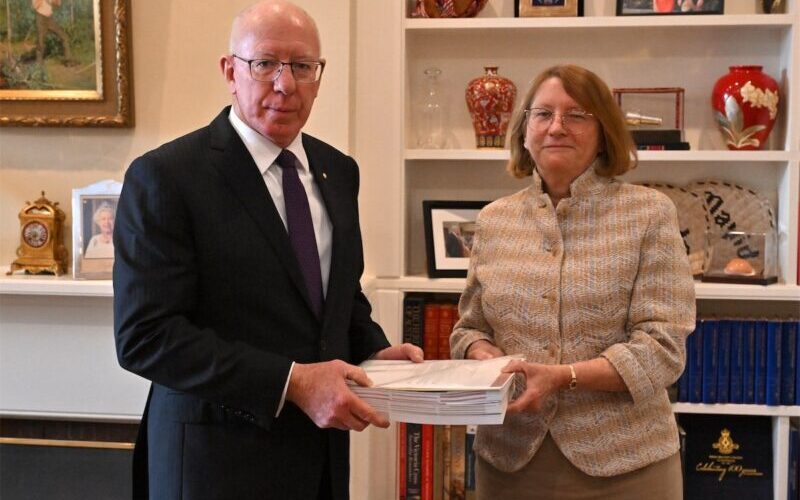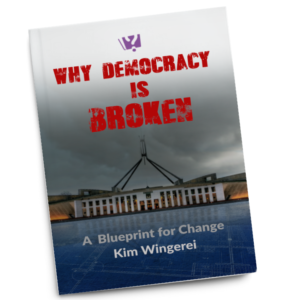
The National Anti-Corruption Commission celebrates its second anniversary this week. Has the much-heralded initiative of the first Albanese government lived up to its expectations? Kim Wingerei asks.
As of June 30, the NACC reports that it received 2,260 referrals over the last 12 months, down from 3,190 the previous year. It currently has five matters before the courts, and 41 matters under investigation by itself or jointly with other agencies. To date, the NACC has secured less than 20 convictions from the 5,450 referrals of potentially corrupt conduct that it has received, or 0.3%.
Next Monday, July 7, is also the anniversary of Robodebt Royal Commissioner Catherine Holmes’ referral of her report to the NACC. It included a sealed chapter that recommended six individuals for civil and criminal prosecution for their roles in the illegal Robodebt scheme. A report she intentionally delayed the release of so that the then newly established NACC could deal with it.
The farce that developed around the Robodebt referral has since been well reported, if not by the mainstream media, certainly on these and other pages of independent media.
A short chronology of the Robodebt Royal Commission and the subsequent referral:
- June 2020 – Labor and the Greens call for a Royal Commission
- May 2022 – a Senate enquiry recommends one be established
- August 2022 – PM Albanese announces RC with $30M budget
- July 2023 – RC Report presented with aforementioned referrals to NACC
This, as many know, is where it all starts to ironically disappear into a black hole of public sector mismanagement and subterfuge.
- June 2024 – NACC announces it will not pursue referrals of the individuals named in the sealed section of the RC Report
- June 2024 – Following public complaints, the NACC Inspector (oversight authority) announces that it will review the NACC’s decision not to further investigate referrals and appoints Alan Roberston SC to conduct the review (kudos to @RonniSalt for alerting 1,200 complainants)
- October 2024 – Following Robertson’s review, the NACC Inspector announces that the NACC is to appoint an appropriate person to reconsider its decision not to further investigate RC referrals.
- February 2025 – NACC announces Geoffrey Nettle KC to “reconsider” the referrals of the six people named in the RC Report.
- June 2025 – NACC announces “re-investigation” now underway, led by Deputy Commissioner Kilgour with Nettle as “Chief Adviser”.
To put it briefly, more than five years after the RC was first contemplated, there is still no resolution regarding who should bear the ultimate responsibility for the decisions made, the actions taken, and the cover-ups that followed.
Deafening silence at flawed process. NACC and the Robodebt investigation.
Aside from the enormous public anger, the heartless lack of consideration for Robodebt victims seeking a just closure and the severely damaged reputation of the NACC itself, including many of its senior officers, what has all this cost? Here’s a summary of the remuneration of the people involved – you can form your own opinion if we’re getting value for money.
NACC Remuneration
| ROLE | REMUNERATION |
|---|---|
| Chief Commissioner | $784,000 p.a. |
| Deputy Commissioner | $613,000 p.a. |
| Inspector of the NACC * | $552,000 p.a. |
| Alan Roberston | $136,000 (3 months) |
| Geoffrey Nettle | $684,000 (8 months) |
* Note – NACC Inspector is a part-time role as she undertakes the same role for NSW ICAC (good work if you can get it). The $552K p.a. remuneration has been commensurately reduced in the above.
Reinvestigating the reinvestigation
Aside from the Chief Commissioner’s self-inflicted ridicule, we also know he managed to implicate at least one other Deputy Inspector in his bungled handling. Hence, the appointment of apparent clean-skin Deputy Commissioner Kilgour and Nettle in the ambiguous role of Chief Adviser to undertake the re-investigation.
According to a MWM source, the NACC’s contract with Nettle was awarded in April 2025 and has since been extended twice, with a current completion date now of December 2025. It would be interesting to know what this role involves and how it aligns with the NACC’s legislative framework.
“It would be a travesty if a legal technicality impeded the prosecution of any adverse findings, as has happened with NSW ICAC, e.g. Nick Greiner & Margaret Cunneen had ICAC findings overturned, even Gladys Berejiklian had a go at getting off.”
Low output at high costs
When compared to public expectations, the NACC’s output has been, at best, abysmal.
With that in mind and the magnitude of dealing with an RC referral complete with subsequent bungling, applying a 15% time allocation to the Chief Commissioner and similar for just one Deputy Commissioner, a conservative cost estimate for the full-time senior staff plus the two fixed term appointments to deal with Robodebt to date is approximately $1.3M.
Drawing on Nettle’s current contract expiry, assuming the re-investigation is concluded by December 2025, add another $300K for Deputy Commissioner Kilgour. An estimated total of approx. $1.6M. This, of course, excludes administration & external support and other operating costs. It’s highly likely there will be no change out of $2M.
The final cost of the Royal Commission was $33.6 million. An investment that will be wasted if there is no full justice arising from what is seen as Australia’s greatest public management failure.
The final cost to the taxpayer is therefore likely to be a minimum $36M+, a figure that will be much higher if one or all of the six referred individuals are ultimately prosecuted.
Additional costs of prosecutions
Unfortunately, there are many examples where the taxpayer perversely funds the cost of legal counsel for public figures (politicians), including Gladys Berejiklian at NSW ICAC and the Robodebt RC itself, where the taxpayer picked up $2.5M legal costs for former Ministers.
If there’s a grifter or two in the referral list (big chance), let’s hope they’ll be required to meet their own costs under the NACC’s re-investigation or any subsequent court prosecution.
But there’s one thing money won’t be able to fix, and that’s the loss of confidence and sense of betrayal that many feel about the NACC and our political class, who created it. We can only hope that Chief Commissioner Brereton is acutely aware of his failures in dealing with Robodebt, as well as the multitude of other unanswered referrals to the NACC over the past two years.
Corruption Commission’s Robodebt failure tells of deeper problems with the NACC


